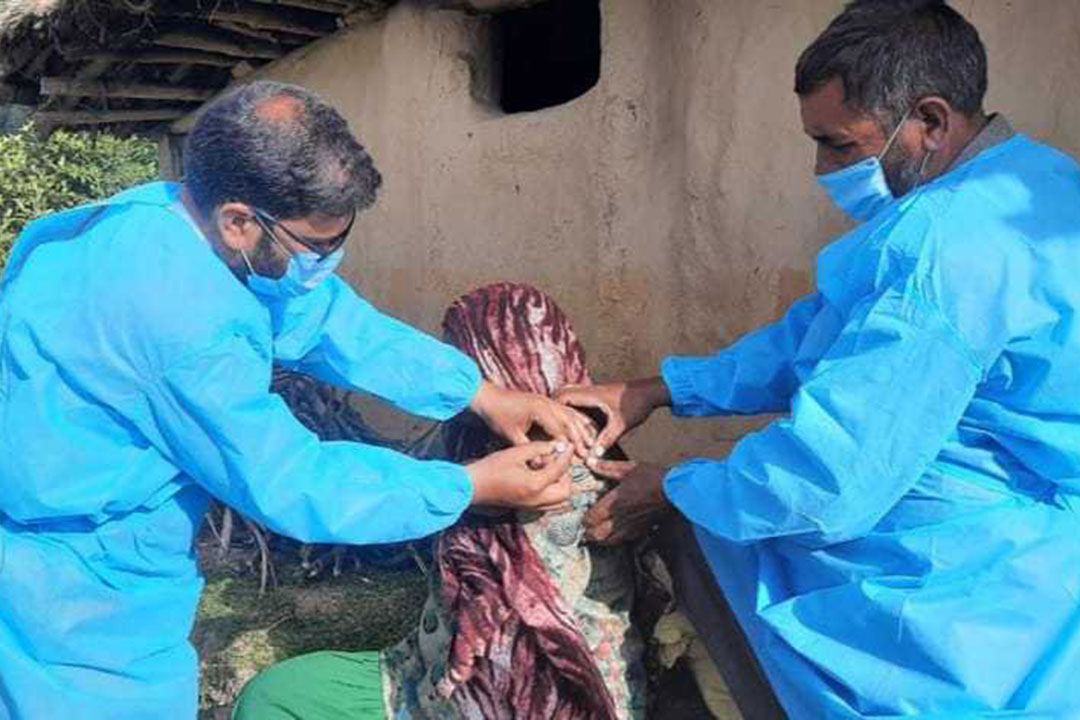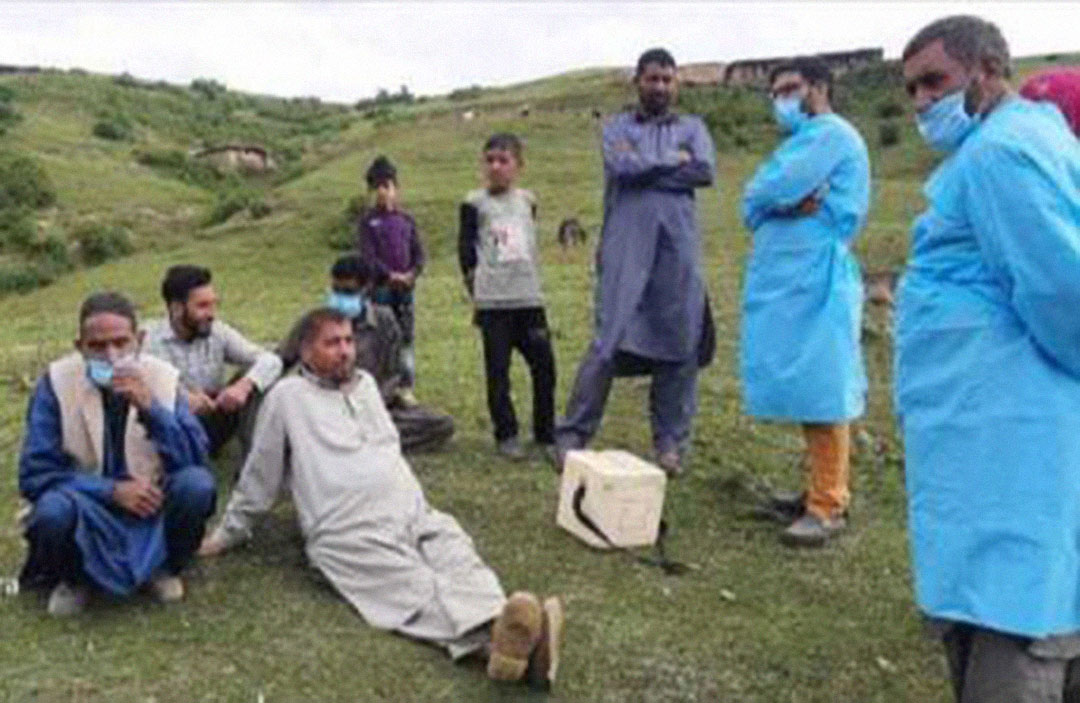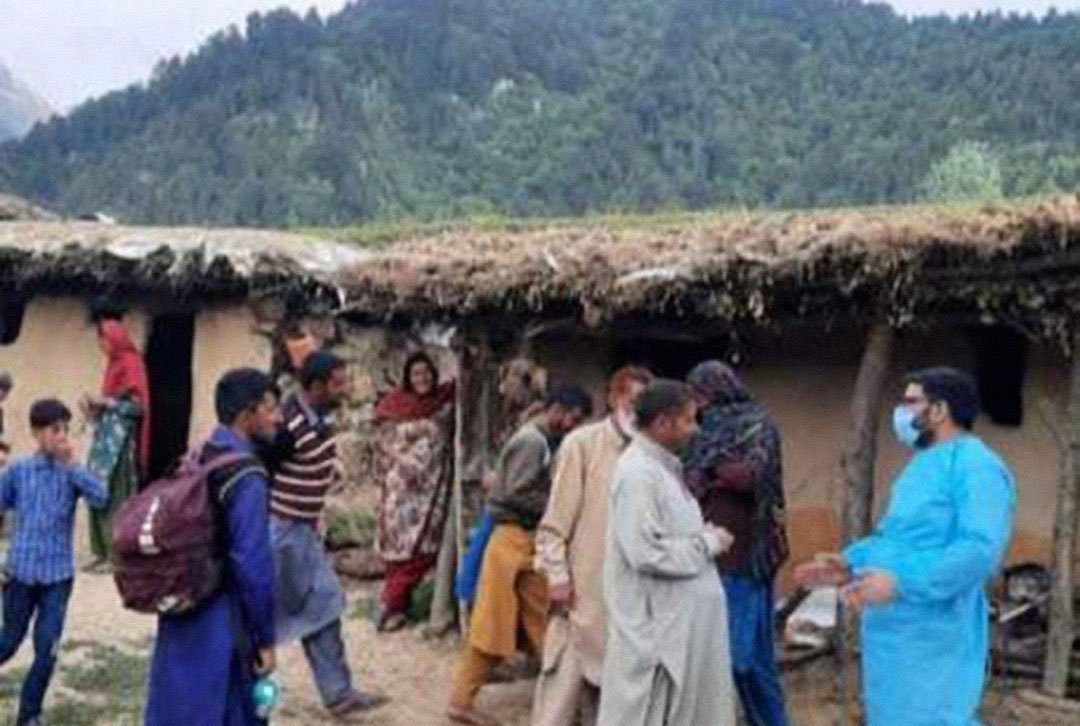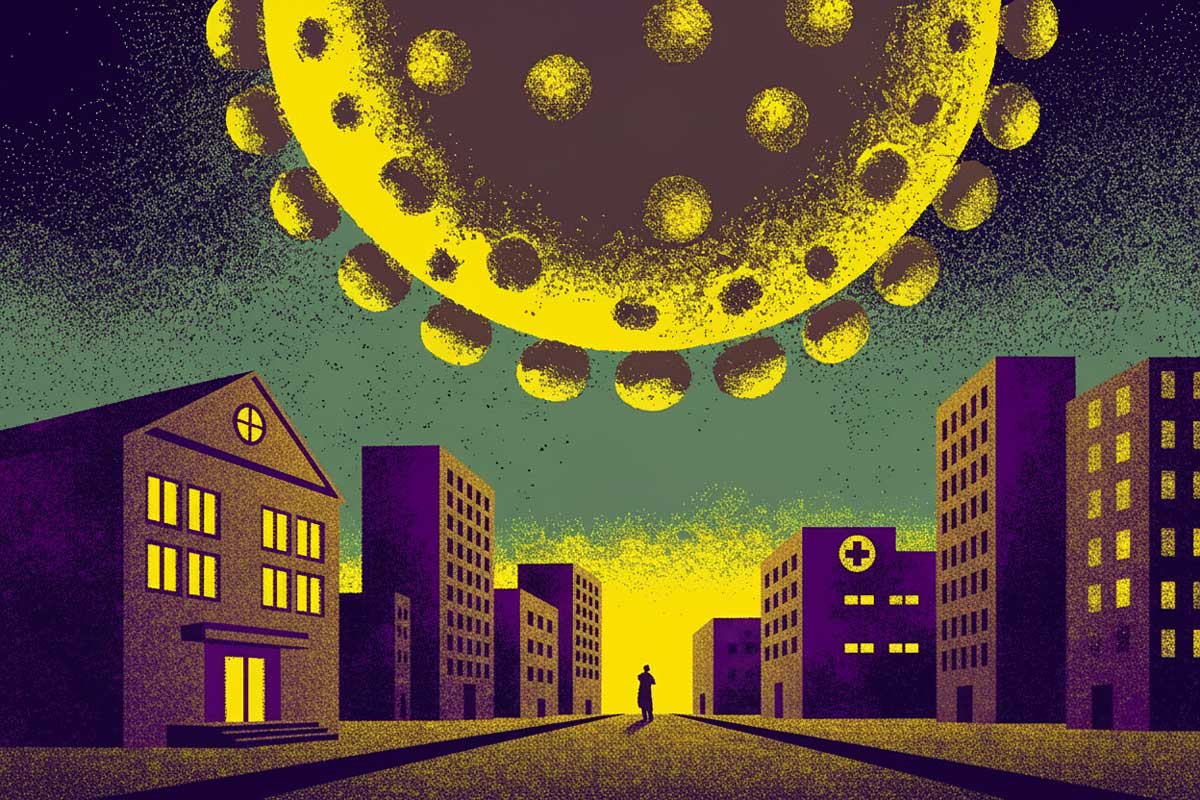How Bakarwal nomads get vaccinated on Kashmir’s mountain meadows
Thousands of Bakarwal pastoralist families trek into the Himalayas for greener grazing in the summer months. Health workers from Srinagar hiked out to meet them, and VaccinesWork went along.
- 11 August 2023
- 6 min read
- by Nasir Yousufi

Zulekha Bano rifled through a couple of bags hanging from the skeleton of her makeshift tented home. The vaccination card she was searching for – her 28-month-old son’s – was nowhere to be found. She must have left the card in Rajouri, on the Jammu plains, she told the inquiring paramedics, who had arrived at the Kashmiri mountain pastures where Bano’s family was encamped carrying cooler bags of vaccines.
“Often we spend nights, consume local food and stay with tribal families to execute our responsibilities. It is a very tough job, but after long hours of effort and hard work, it is the smile on the face of the people – kids, women or men – that keeps workers like me going. The fact that our hard work as vaccinators plays a role in keeping the community safe from viral diseases is enough to lift my mood up.”
– Mohammad Hussain, vaccinator
Rajouri was 300km away. Bano’s family had only recently completed their annual trek up into the Himalayas. Outside family’s hut, the sloped, high-altitude Ledwas meadows rolled away, picturesque even on an overcast day.

Credit: Nasir Yousufi
Bano and her children belong to the Bakarwal pastoral community, who seasonally migrate between the lowlands and highlands of the Indian union territory of Jammu and Kashmir with their grazing herds.
The annual transhumance begins in May and June, and sees thousands of the families walking for more than a month through mountain passes, highways and towns to reach greener high altitude pastures. After spending four to five months there in doks or makeshift tents, these families return back to Jammu plains at the onset of winter.
It’s a life that comes with particular challenges – keeping up to date with childhood immunisation being one of them. But vaccinators in the Kashmir valley regularly hike into the higher reaches to serve this often scattered population.
The paramedics and Bano spoke in hectic tones, puzzling out the toddler’s vaccination history verbally to make sure he would not be left unnecessarily vulnerable to disease.

Credit: Nasir Yousufi
“Vaccination of Bakarwal nomads is always a challenge. Since their vaccination is carried out at different locations, often it has been seen that they do not carry vaccination cards with them,” said Dr Nighat Majeed, Deputy Chief Medical Officer for Srinagar district, the capital of Jammu and Kashmir, “So it becomes hard to figure out the exact dates for their vaccines or even the vaccines they have missed out. So we make it a point to reach all the people, contact each family individually and vaccinate them accordingly.”
We are miles away from any human settlements. [...] In fact, nobody dares to tread these meadows. But imagine how a group of health workers from the nearest health centre arranges for our vaccination. During COVID-19 pandemic, they stayed for nights to vaccinate us all.”
Khalid Poswal, Bakarwal community member
Mohammad Hussain, aged 39, a health worker posted at Fakir Gujri Health Subcentre on the outskirts of Srinagar, has been carrying out vaccination of Bakarwal nomads in the mountainous meadows of Dachigam during the summer months for the past 12 years.
“It is not easy to carry out vaccination in the upper mountains. We have to walk through steep ridges and passes continuously for six to eight hours to reach out to families. After reaching these grazing fields, we gather the beneficiaries at a common place, as the families who stay there are often scattered along the vast greener stretches,” said Hussain. “In the evening, we instal tents for night stay, or sometimes stay with the nomads in their doks or temporary mud hutments,” he added.
“My family lives about two kilometres from here in the upper part of the Ledwas. As soon as I heard about the visiting team, I, along with my three-year-old daughter, rushed quickly to get vaccinated,” said pregnant housewife Zareena Khatoon.
Apart from mobility and logistics, the risk from wild animals is also a concern that troubles the travelling health workers.
“There are lot of bears and leopards in these mountains. Apart from carrying stout sticks and torches, we ensure we move in a group of three to four in order to ensure the protection of members in the team,” said Liyaqat Ahmad, another health worker from Fakir Gujri.
Have you read?
Vaccinating the nomadic community involves intense planning by the health authorities.
According to Dr Tabasum Jabeen, Director of Family Health and Immunisation for Kashmir, after the main vaccination drive, a follow-up session is arranged in the next week to cover drop-outs or the missed-out people. These two-part immunisation efforts are carried out twice in a month in the upper reaches of the Kashmir, particularly in meadows where Bakarwal families stay during summers.
One of the biggest challenges, say the health workers, is the vulnerability of the vaccines to temperature shifts – vaccine cool-boxes are only able to maintain the required temperatures for so long. “Though there is a solar powered cold chain storage point at base station in Fakir Gujri, we have to ensure that the vaccines are carried to upper reaches in time. So the members from the team always have to move fast and non-stop to avoid any spoilage of the vaccines,” said Hussain.
“Often we spend nights, consume local food and stay with tribal families to execute our responsibilities. It is a very tough job, but after long hours of effort and hard work, it is the smile on the face of the people – kids, women or men – that keeps workers like me going. The fact that our hard work as vaccinators plays a role in keeping the community safe from viral diseases is enough to lift my mood up,” he added.
Some Bakarwal people believe the government should employ the services of the community to provide hassle-free basic healthcare services in far off, high-up places, and reduce the seasonal pressure on the established healthcare system.
Bakarwal activist and youth leader Irshad Ahmad, who hails from south Kashmir’s Kokernag area, suggested that government should recruit and train the educated youths from the community to provide primary care in the remote meadows.
Life here is highly exposed to risk and the elements. “It is never easy to live a relaxed life in these locations. Direct sunshine makes our days hotter and the cool winds make the nights cooler. A spell of rain creates havoc. Apart from children and others, we have to protect our livestock too, “said Mohammad Akram Khatana, a 52-year-old family head from the Bakarwal tribe.
While most community members, including children, spend daytime hours in taking care of grazing animals and doing household chores, the families ensure that one or two male members are awake during night to stay vigilant for the risk from wild animals.
The families mostly stock up on rations and other essential items to cover them during their mountain months. Occasionally the young men from the group are dispatched to nearby plains for essential consumables and medicines.
“We are miles away from any human settlements,” said Khalid Poswal, a young undergraduate student pursuing his university degree remotely while living in the Ledwas upper reaches with his family. “In fact, nobody dares to tread these meadows. But imagine how a group of health workers from the nearest health centre arranges for our vaccination. During COVID-19 pandemic, they stayed for nights to vaccinate us all,” he said.
More from Nasir Yousufi
Recommended for you









